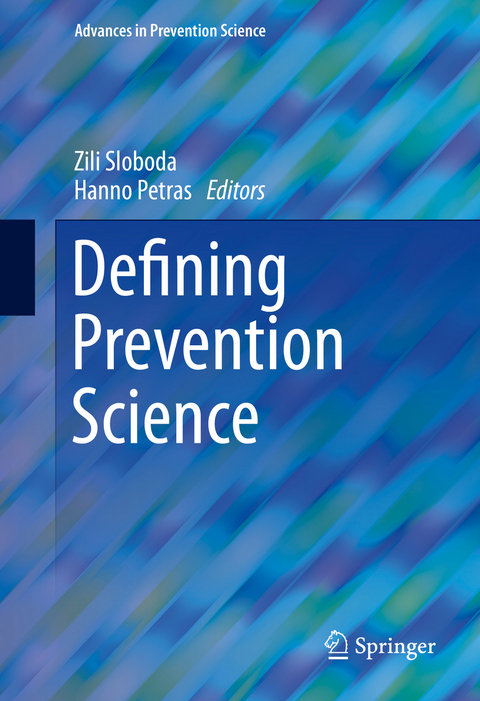
Defining Prevention Science
Springer-Verlag New York Inc.
978-1-4899-7423-5 (ISBN)
Defining Prevention Science covers this emerging field of science: its goals, its conceptual and theoretical foundations, its methods and especially its utility. Not content to simply differentiate the field from its close allies: epidemiology, psychology, neuroscience, sociology, economics, the text explains how these many disciplines enhance each other at both research and intervention levels and how prevention science draws on these biological, behavioral and social sciences to create an innovative knowledge base that has provided cost-effective, evidence-based prevention interventions and policies. To this end, familiar developmental benchmarks are recast in prevention/health promotion context, from the crucial importance of adolescence in encountering and deterring high-risk behaviors to the risks and resiliencies of single-mother families. An international group of contributors offers current findings, up-to-date methods for effective evidence-based interventions and improvements in research technologies in these key areas:
Physical, cognitive and emotional vulnerability across the life course.
The roles of developmental influences in prevention.
Intervention development, delivery and implementation.
Bringing the intervention approach to research design.
New directions in analytic methods.
Cost analysis and policy implications.
Advances in Prevention Science: Defining Prevention Science aims to inspire further refinements in the fieldand encourage communication among researchers in its own and related disciplines, including public health, epidemiology, psychology, and criminology. This is the first volume in the series, Advances in Prevention Science, that provides the framework for other volume that will focus on such issues as: Prevention Science in School Settings: Complex Relationships and Processes; Preventing Crime and Violence and The Prevention of Substance Use.
Prevention Science: An Epidemiological Approach Individual Physical, Cognitive, and Emotional Vulnerability across the Life Course: Benchmarks and Developmental Challenges.- Pre-natal and Infancy.- Childhood and the Entry into Adolescence: A Pivotal Period in Health-Related Behaviors and Prevention.- Adolescent and Early Adulthood.- Stressors and Vulnerabilities in Middle and Old Age: Opportunities for Prevention.- Environmental Influences.- Family.- School Influences on Child and Youth Development.- Peer Networks.- Risk and Resilience Processes in Single Mother Families: An Interactionist Perspective.- Environmental Influences: the workplace and mental health: models, vulnerability factors and interventions.- An Integrated Prevention Science Model - A Conceptual Foundation for Prevention Research.-Design of Preventive Interventions.- Implementation Science and the Effective Delivery of Evidence-Based Prevention.- Factors Impacting Implementation: Training and Cultural Adaptation.- Measuring Fidelity.- Research Design.- Translating the Intervention Approach into an Appropriate Research Design –The Next Generation Designs for Effectiveness and Implementation Research.- The Epidemiologic Case-Crossover and Case-Control Approaches in Prevention Research.- The Use of Simulation Models in Public Health with Applications to Substance Abuse and Obesity Problems.- Meta-analysis in Prevention Science.- Mixed Methods Research Design for Prevention Science Methods, Critiques, and Recommendations.- Analytic Methods.- Latent Class Analysis in Prevention Science.- Discrete-time Survival Analysis in Prevention Science.- Using Mediation and Moderation Analyses to Enhance Prevention Research.- Analytic Methods: Advances in Missing Data Models and Fidelity Issues of Implementing these Methods in Prevention Science.- Cost Analysis and Policy.- Economic Analysis and Policy Studies: Special Challenges in the Prevention Sciences.- Strengthening prevention science to ensureeffectiveness of intervention in practice: setting up an international agenda.
| Reihe/Serie | Advances in Prevention Science |
|---|---|
| Zusatzinfo | 39 Illustrations, black and white; XXII, 626 p. 39 illus. |
| Verlagsort | New York |
| Sprache | englisch |
| Maße | 155 x 235 mm |
| Themenwelt | Medizin / Pharmazie ► Allgemeines / Lexika |
| Studium ► Querschnittsbereiche ► Epidemiologie / Med. Biometrie | |
| Studium ► Querschnittsbereiche ► Prävention / Gesundheitsförderung | |
| ISBN-10 | 1-4899-7423-7 / 1489974237 |
| ISBN-13 | 978-1-4899-7423-5 / 9781489974235 |
| Zustand | Neuware |
| Haben Sie eine Frage zum Produkt? |
aus dem Bereich


